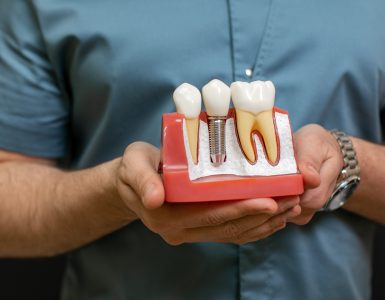Have you ever felt pain or discomfort in your teeth after eating ice cream or having a hot drink? If so, you’re not alone. Whilst this pain could be a sign of a cavity, it is also a common symptom in people who have sensitive teeth.
There are some steps you can take to help manage the pain and discomfort of sensitive teeth.
- Over the counter treatments. For mild tooth sensitivity, there are toothpastes available made specifically for sensitive teeth with ingredients that help block the discomfort from travelling to the nerve of the tooth. Your dentist may be able give you a specific recommendation, but there are many you can choose from. Also, if you use a mouthwash choose one that is alcohol free and fluoridated and change to a softer toothbrush, remembering to brush your teeth more gently. This will be much easier on your gums and prevent further wear on your tooth enamel. You should experience some improvement within a week or so.
- Fluoride gel. Applying a fluoride gel to your teeth helps to strengthen the enamel by replenishing the minerals lost, helping to desensitise the dentin.
- Avoid highly acidic foods and beverages. Staying away from acidic foods and drinks will help prevent further wear on your tooth enamel.
- Stop clenching and grinding your teeth. If you find yourself regularly clenching or grinding your teeth, try to train yourself to stop by being mindful not to do so during the day. Reducing stress and caffeine intake at bedtime may help prevent you grinding your teeth at night. You may want to consider using a mouthguard at night to prevent any damage to your teeth.
- Brush more gently. If you have a problem with receding gums, it is important to brush more gently and maintain good oral hygiene. If the recession is severe and is causing significant discomfort, a surgical gum graft may be necessary. Tissue is taken from the roof of the mouth and placed over the root of the tooth to secure and protect it, thereby reducing sensitivity.
- Dental treatment. For teeth where a large part of the enamel is lost due to decay or significant damage, the tooth will need to be covered with a crown, inlays or bonding.
- Root canal. For severe sensitivity where other treatments are not working, a root canal is recommended as a last resort. The infected pulp of the tooth is cleaned and disinfected and the tooth is then filled and sealed.
As always prevention is best. Ensure you attend regular check-ups with your dentist and maintain your oral hygiene by brushing twice a day, together with daily flossing to keep your teeth in good condition.




